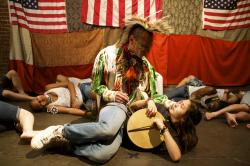
Glenda Frank
| “Trail of Tears” by Thomas J. Soto
Conceived
and developed for the stage by Rajendra Ramoon Maharaj, Rebel Theatre
Company, and The Eagle Project.
The title is both metaphorical and a reference to the brutal relocation of the Cherokee Indians to Oklahoma from their home in Georgia. The story of the Cherokees is particularly poignant. A peaceful people, they were so culturally sophisticated that they established the first newspaper in Oklahoma after bringing in the first printing press. They also introduced the telephone to the territory. But Soto is more concerned with the plight of the outsiders. The production opens with a young Native American woman who feels rejected by her people because she is gay. While the Navajo, Zuni and Plains Cree Indians valued their Two-Spirited members, the Cherokee disapproved. As she sleeps, four guardian spirit visit and then a dancer in full regalia. (Although his costume is not authentic, it conveys the magnificence of his presence as does his dancing.) The dancer is the spirit of the ancestors. The young woman is the emotional center, our guide, as the work moves back in time to the various removal policies. We meet several peruked presidents, pronouncing policy decisions. The chorus wears white shirts with red and blue paint splatter. As they die, a result of government intervention, the red becomes their blood. The red, white and blue colors are both symbolic of who they are – Americans – and the irony. Scattered throughout the piece are the Pledge of Allegiance, The Star Spangled Banner and other patriotic songs recited with irony that tips into sarcasm by the Native Americans. We hear the phrases through their experience. It is unsettling. The strength of the work is how the victims react as a group. The cerebral becomes the actual. In the rape and beating scenes, the faces of the terrified victims are haunting. The most moving moment was the tale of a father who lost his wife. His son, who was starving, howled in pain. The soldiers rounded up the crying children and drowned them. Actors step out of the chorus of 16, a mixture of Native Americans and others, to play individual roles: presidents, victims, soldiers, story tellers. The program identified them all as starring: Christopher Augustine, Samantha Clark, Nerea Duhart, Christopher Robert Ellis, Tony Enos, Darleen Rae Fontaine, Olivia Hoffman, Alana Inez, Wolfen de Kastro, Javon Minter, Michael Nephew, Richard Perez, Lamar Perry, Ryan Victor Pierce, Sheldon Raymore, and C. G. Reeves. The net cast by the production is inclusive. The young woman often speaks Spanish and testimony is offered from many tribes. It is hard to get a bearing. It seems that the creative team is going for affect, which limits the work to preaching to the congregation. Founded in 1973 in poet Miguel Algarin’s living room, the Nuyorican Poets Café has dedicated itself to championing poetry, theatre, and music by under-represented voices. Rebel Theatre is their first residential company. |
| museums | NYTW mail | recordings | coupons | publications | classified |

